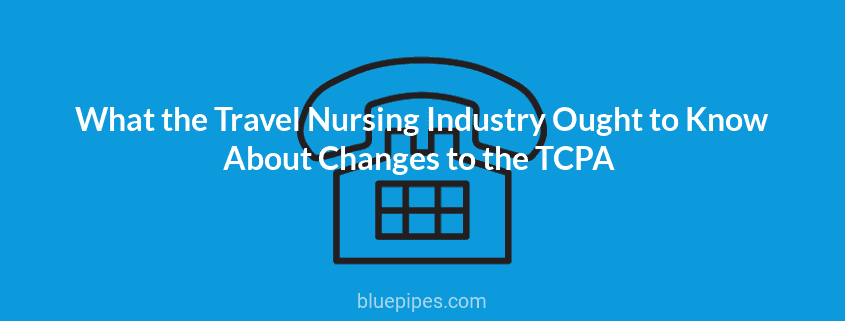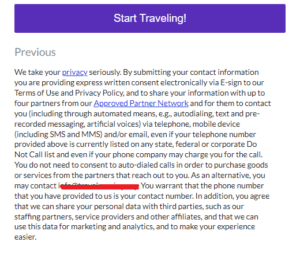What the Travel Nursing Industry Should Know About Changes to the Telephone Consumer Protection Act
The United States Federal Communications Commission (FCC) made changes to rules regarding the Telephone Consumer Protection Act (TCPA) that will begin to take effect in January, 2025. These rule changes stand to have a sizeable impact on how businesses utilize automated phone calls and text messages to contact consumers. Everyone in the travel nursing industry knows that travel nursing agencies rely heavily on phone calls and text messages to reach travel nursing candidates. So, in this article, we’ll provide details on the FCC’s rule changes.
Disclaimer: I am not a lawyer, and the information provided in this article is for general informational purposes only. It should not be construed as legal advice. For advice on your specific situation, please consult with a qualified legal professional.
What is the Telephone Consumer Protection Act?
The United States federal government enacted The Telephone Consumer Protection Act (TCPA) in 1991 to regulate telemarketing calls, auto-dialed calls, prerecorded voice messages, text messages, and unsolicited faxes. The TCPA’s primary goal is to protect consumers’ privacy by restricting the ways businesses can contact individuals.
The TCPA’s key provisions included:
- Consent Requirement: Businesses must obtain prior express consent from individuals before making telemarketing calls or sending text messages using an automatic telephone dialing system (ATDS) or prerecorded voice messages.
- Do-Not-Call List: The law established the National Do Not Call Registry, allowing consumers to opt-out of receiving telemarketing calls from businesses. Telemarketers are prohibited from calling numbers on this list without express consent from individuals to do so.
- Restrictions on Calling Times: Telemarketing calls can only happen between 8 a.m. and 9 p.m. local time of the recipient.
- Caller Identification: Telemarketers must provide accurate caller ID information, including their name and the name of the business they represent.
- Penalties for Violations: The TCPA allows individuals to file lawsuits against violators. Consumers can seek statutory damages, which range from $500 to $1,500 per violation, depending on whether the caller willfully violated the rules or not.
The government clarifies and expands the TCPA’s rules periodically, particularly as technology and communication methods evolve.
With all that in mind, let’s take a look at the most important rule changes coming in 2025 for the TCPA as they pertain to the travel nursing industry.
Closes the Travel Nursing Lead Generator Loophole
The FCC’s new “one-to-one consent rule” is the most important TCPA change for the travel nursing industry. This rule takes effect on January 27, 2025.
The major change here is that blanket consent to robocalls and robotexts is no longer an option. Instead, the rule makes it unequivocally clear that comparison shopping websites and lead generators must obtain consumer consent to receive robocalls and robotexts one travel nursing company at a time.
The FCC’s new rules specifically state these websites can’t even provide a link to a page where the travel nurse can view a list of the companies the website will share their information with. For example, the image below shows an example that no longer qualifies as consent to automated calls or texts:
Instead, websites must give travel nurses the option to select the specific companies they want to share their information with on the same page they will submit their consent.
Examples of Travel Nursing Lead Generation the New Rules Target
Let’s run through some scenarios to clarify. Many websites dedicated to travel nursing have landing-pages that say something like, “Enter your contact information here and we’ll connect you with the top travel nursing agencies.” Meanwhile, their privacy policies state that users agree to have their information released to the website’s partners and to receive robocalls and robotexts from them. This is a type of blanket consent that will no longer satisfy the requirements.
Similarly, some travel nursing websites have job boards that allow healthcare professionals to apply for specific jobs with specific companies. That is okay because it meets the one-to-one consent requirement, so long as the page also provides clear and conspicuous disclosure. However, sometimes these websites have privacy policies that state you’re giving them permission to share your information with all their partners for robocalls and robotexts by simply entering your information anywhere on their website. This is a type of blanket consent that will no longer satisfy the requirements.
As a travel nursing agency, you may be utilizing websites that allow you to search for candidates and then “unlock” their contact information. This is another example that will no longer satisfy the requirements.
Again, moving forward, legal consent for travel nursing companies to make robocalls and robotexts requires that travel nurses specifically select to receive robocalls and robotexts from the company on a one-to-one basis.
The National Do Not Call Registry Applies to Text Messages
Next, the FCC’s new rules extend the National Do Not Call Registry’s existing protections to text messages.
Clarifying the Types of Calls and Texts
That said, it’s important to parse everything out for clarity. If a phone number is in the National Do Not Call Registry, then telemarketers must obtain obtain one-to-one consent in order to make texts or calls of any kind to that number.
If a telephone number is not in the National Do Not Call Registry, then, under the new rules, telemarketers must obtain one-to-one consent to make calls from automatic telephone dialing systems and send texts from automated texting systems. However, if the number is not in the National Do Not Call Registry, then telemarketers could still make manually dialed telephone calls and send manually typed one-to-one text messages even if they received the lead from a lead generator that uses blanket consent. They may do so until the consumer revokes consent.
Clear and Conspicuous Disclosure is Required
Next, the FCC’s new rules state that websites must provide a clear and conspicuous disclosure that the travel nurse is agreeing to receive robocalls and robotexts from the agencies they select in order to meet consent requirements.
Consent only Covers Topically Related Subjects
Additionally, the FCC makes it clear that when travel nurses give consent for robocalls and robotexts via lead generation or comparison-shopping websites, they are giving it only for topically related subjects.
Consent is not Transferrable
Moreover, the FCC’s reports point out that consent is not transferrable. Again, the travel nurse must give consent directly to the agency. This prevents daisy-chaining contact information from one organization to the next.
Who is Liable for Following the TCPA’s Rules?
In their reporting on the new rules, the FCC reiterates that existing rules already place the burden of proof for satisfactory consent on the texter or caller. They specifically state that callers and texters cannot rely on lead generators to maintain proof of consent.
Thankfully, this isn’t something we need to worry about at BluePipes. We only share contact information with companies that travel nurses specifically select for us to share it with by applying to jobs or sharing directly with recruiters.
Revoking Consent
The FCC also added and clarified rules regarding consent revocation. First, the FCC codified a previous ruling that consumers can revoke consent through any reasonable means.
These rules prohibit callers from establishing a single method they will accept for revoking consent. Instead, callers must accept any reasonable revocation request including, but not limited to the following examples the FCC provides in their reporting:
- Any revocation request made using an automated, interactive voice or key press-activated opt-out mechanism on a robocall
- Any response of “stop” or a similar, standard response message sent in reply to an incoming text message
- Any request to stop submitted at a website or telephone number provided by the caller to process opt-out requests
- Any method other than those above, such as those made by voicemail or email to any telephone number or address at which the consumer can reasonably expect to reach the caller.
Additionally, the FCC’s reports on this topic confirm that when a consumer revokes consent, they are revoking consent for both robocalls and robotexts. For example, if the consumer revokes consent by replying “Stop” to a text message, they are also revoking consent for robocalls.
Finally, the new rules require that robocallers and robotexters honor do-not-call and consent revocation requests within 10 business days from receipt.
Consequences for Not Complying
The consequences for violating the rules come in at least three forms. First, the FCC and/or service providers may block calls and texts from offending phone numbers. Service providers monitor complaints they receive and may willingly block phone numbers on their own. And, the FCC may alert service providers to block numbers for which the FCC has received complaints.
Second, the FCC may levy fines or even work to prosecute organizations that repeatedly violate the rules.
Finally, consumers may pursue legal action against organizations that violate the rules. The TCPA provides for statutory damages of $500 for each call or text that violates the rules. And, if a court finds that the violation was knowing or willful, then the court can increase the damages up to $1,500 per violation.
What it means for the travel nursing Industry
Obviously, the FCC’s new TCPA rules will impact different parties in different ways. For travel nurses, the rules should help protect their privacy and make it easier to control when and how they receive inquiries. However, travel nurses must still thoroughly review privacy policies and terms of use before submitting their contact information.
Services that connect travel nurses with agencies will need to be transparent with their processes and procedures. Those that were relying on blanket consent may be in for a rude awakening as their revenue and profit margins may take a hit. I only say this because this is what some of the nation’s largest lead generators have stated they are concerned about.
Travel nursing agencies should make sure they understand whether or not the lead generation services they partner with comply with the new rules. They should also ensure that they have processes and procedures in place to handle consent revocation requests. Moreover, they should make sure that they have processes and procedures in place for reactivating consent in cases where someone who once revoked consent grants it anew.
Finally, travel nursing agencies without automated job order management tools should strongly consider implementing such tools. This is because job postings may be the most viable method for obtaining one-to-one consent.
As always, I hope you found this information useful. Please contact us if you might have any additional useful information to add to this article.






